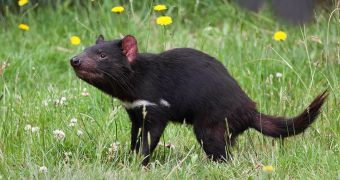An extremely aggressive form of cancer is currently affecting the very existence of the Tasmanian devils. The creatures are plagued by a very aggressive form of cancer, which prevents them from feeding. In a new study, after years of work, investigators have finally been able to decode the cancer's genome.
The disease leads to the development of tumors on the face of the animal, affecting its eyes and its mouth. In time, eating becomes extremely painful. Death follows shortly, brought on by starvation.
The condition is extremely aggressive and fast acting, and easily transmissible between individuals. The devils are very territorial, and likely to engage in confrontations where they bite each other in the face. This provides the cancer with an excellent way to move from one individual to the next.
Fully aware of these issues, investigators from the Wellcome Trust Sanger Institute, near Cambridge, in the United Kingdom, decided to try to decode the cancer's genome. They recently announced that the work has been completed.
Working as part of an international team, the scientists published all the details of their study in the latest issue of the esteemed scientific journal Cell. One of the most important aspects of the work is that it shows how the cancer manages to fool the Tasmanian devils' immune systems into not attacking it.
Genetic analyses of samples brought back from the field revealed that this form of cancer first developed in a female Tasmanian devil. Knowing the point of origin is very important for geneticists, Science Blog reports.
“Our findings indicate that it’s a relatively stable cancer, one whose genome has remained fairly intact in spite of the fact that it’s transmissible and it has passed through a number of individuals,” explains the lead author of the paper, Dr. Elizabeth Murchison.
“This shows that a cancer does not need to have an incredibly unstable genome in order to become transmissible,” she goes on to say. In total, the group discovered that the cancer genome had about 17,000 genetic mutations, significantly fewer than what the team was expecting to find.
“We still don’t know how the cancer is able to spread without eliciting an immune response. We’d like to understand this more, ultimately so that we can work to develop vaccines and therapies that could help with conservation,” Murchison says of the team's future plans.

 14 DAY TRIAL //
14 DAY TRIAL //